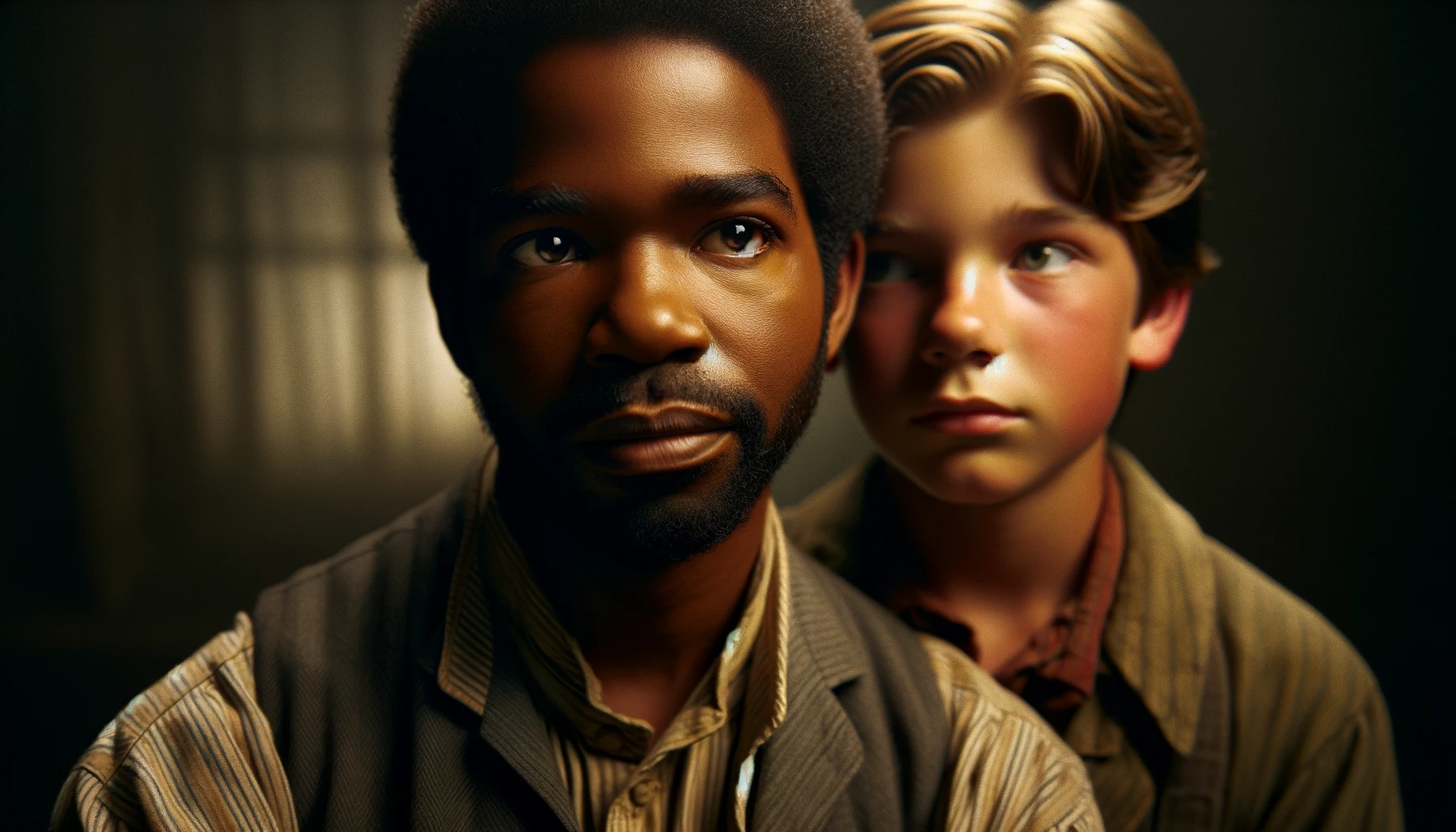In the world of American classics, “Adventures of Huckleberry Finn” by Mark Twain is a giant. Published back in 1884, this novel takes you on a journey with a young boy named Huck Finn who decides to fake his own death and escape from home. On his adventure, he meets Jim, a runaway slave, and together they experience all sorts of wild and dangerous adventures. Twain, right from the start, cheekily warns his readers not to look for any deep meaning or plot in his story. He also mentions he’s used different ways of speaking to make his characters more real, hoping readers wouldn’t think they’re all supposed to sound the same.
Despite Twain’s warnings, “Huck Finn” didn’t escape controversy. Some people called it “trash” and even banned it from libraries. Fast forward to modern times, and you’ll still find debates about its place in school curriculums. Yet, amidst all this, the book remains a cherished piece of American literature.
Enter Percival Everett, a renowned novelist, who brings us “James,” a novel that retells Huck Finn’s story from Jim’s perspective. But don’t think of it as Everett critiquing Twain. Instead, he views it as adding to the conversation, offering a story Twain himself couldn’t provide. Everett’s take is not about pointing fingers but exploring Jim’s life with a fresh lens, aiming to enrich the original tale rather than dispute its value.
One of the groundbreaking aspects of “Huck Finn” was how Twain captured the American voice, showcasing the rich tapestry of dialects across the country. This was both innovative and, for some, uncomfortable. Everett’s “James” takes this linguistic diversity a step further by imagining a world where Jim and other enslaved characters can speak “proper English” but choose to hide it to navigate their oppressive environments.

For example, Everett presents a scenario where Jim addresses the potential danger of a grease fire, using it as a teaching moment for his children. Jim asks them a hypothetical question: “Mrs. Holiday is about to throw water on it. What do you say? Rachel?” Rachel at first says, “Missums that water gone make it wurs!” Here, Jim points out that the issue isn’t just about the fire but how to tell Mrs. Holiday about the danger without ‘crossing the line’ or appearing too knowledgeable.
Jim encourages them to try a different way, leading to Lizzie’s attempt: “Would you like for me to get some sand?” When Jim insists on translating it to fit their imposed social status more closely, Lizzie corrects to, “Oh, Lawd, Missums ma’am, you wan fo me to gets some sand?” Jim finally approves, emphasizing the need for such translation to stay safe.
Everett is known for his unique blend of humor and irony, even when dealing with heavy subjects like race and identity. His ability to inject levity into serious conversations has resonated with readers and fellow creators alike, such as Cord Jefferson, who adapted Everett’s “Erasure” into the acclaimed movie “American Fiction.” Everett’s humor isn’t about making light of serious issues but highlighting the absurdities and contradictions in society’s approach to them.
Despite the acclaim and attention his work receives, Everett remains modest about his impact. In a culture that often sidelines literary novels, he questions how much influence a book like “James” can truly have. Yet, his work, including this latest novel, continues to spark discussions, challenge perceptions, and add valuable perspectives to the literary world.
This article is based on the following article:

Background Information
Understanding these aspects provides the reader with a foundation to appreciate the complexity and significance of both “Adventures of Huckleberry Finn” and “James.” It showcases the evolving conversation around literature, history, and race in America, highlighting how contemporary authors like Percival Everett engage with classic works to explore and expand upon their themes and implications.
Mark Twain and “Adventures of Huckleberry Finn”
- Mark Twain, whose real name was Samuel Langhorne Clemens, was an American writer, humorist, entrepreneur, publisher, and lecturer, known as one of the greatest American writers.
- “Adventures of Huckleberry Finn” was published in 1884 and is often called the “Great American Novel.” It follows the story of Huck Finn, a young boy who runs away from home and floats down the Mississippi River on a raft with Jim, an enslaved man seeking freedom. The novel is celebrated for its deep themes that explore racism, morality, freedom, and friendship.
- The novel uses various dialects to represent the speech patterns of different characters authentically, a groundbreaking approach at the time that added to the realism and depth of the narrative.
Dialect and Language
- Dialect refers to a particular form of a language that is peculiar to a specific region or social group. Twain’s use of dialect in “Huckleberry Finn” was innovative in literature at the time, capturing the unique voices of the American South.
- The authenticity of these dialects helps to immerse readers in the setting and characters but has also been a source of controversy and misunderstanding.
Controversy Surrounding “Huckleberry Finn”
- Despite its status as a classic, “Huckleberry Finn” has been a source of contention due to its portrayal of race and use of racially offensive language. It has been banned or challenged in various schools and libraries throughout history.
- The novel’s depiction of Jim, the enslaved man, has been criticized for perpetuating stereotypes, while others argue that Twain was critiquing the racism of his time.
Percival Everett and “James”
- Percival Everett is a contemporary American author known for his novels, short stories, and poetry that often explore themes of race, identity, and the complexities of American culture.
- “James” is Everett’s novel that retells the story of “Huckleberry Finn” from the perspective of Jim, offering a new viewpoint on the events and themes of Twain’s original. Everett’s work is not meant to be a critique of Twain but rather an expansion of the narrative, providing depth to Jim’s character and exploring his experiences and perspectives.
The Importance of Perspective
- Everett’s novel highlights the importance of perspective in storytelling. By focusing on Jim’s point of view, “James” enriches the original story with new insights and emotional depth, encouraging readers to consider the experiences of those who have historically been marginalized or silenced.

Debate/Essay Questions
- Is it beneficial or necessary to reinterpret classic literature from the perspectives of marginalized characters, as Percival Everett does with Jim in “James”?
- Does the use of dialect in literature, as Mark Twain employed in “Huckleberry Finn,” enrich the narrative and character development, or does it reinforce stereotypes and create barriers to understanding?
- Given the controversy around “Adventures of Huckleberry Finn” and its depiction of race and use of offensive language, should it still be included in school curriculums? If so, how should educators address its complex themes and language?
- Everett’s decision to have Jim and other enslaved characters speak “proper English” as a form of resistance highlights the power of language. How does the way characters speak influence our perception of them and their societal roles?
- Percival Everett is known for using humor and irony when addressing serious subjects. Is this approach effective in creating dialogue about race, identity, and other significant issues, or does it risk diminishing the gravity of these topics?
- How do works like “James” contribute to the evolution of American literature and our understanding of historical narratives and cultural identity?
Please subscribe to Insight Fortnight, our biweekly newsletter!
